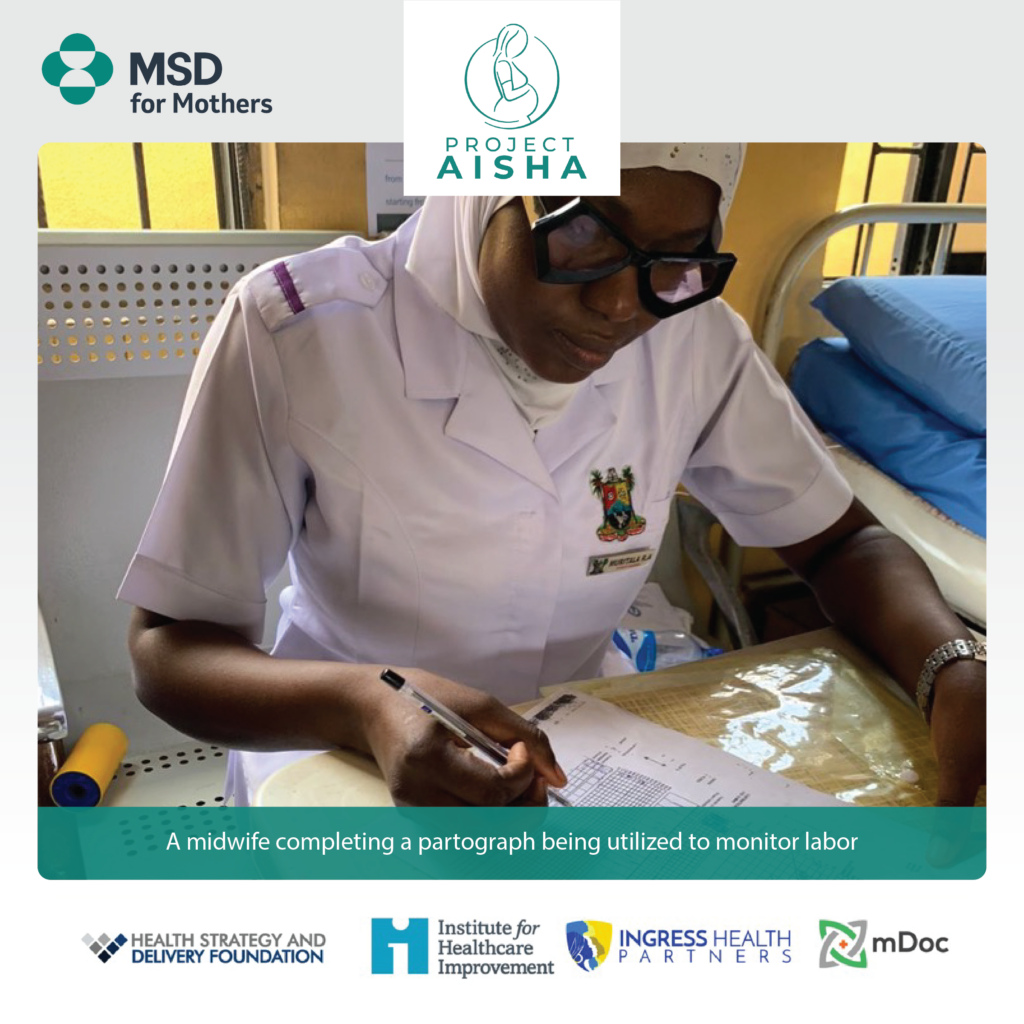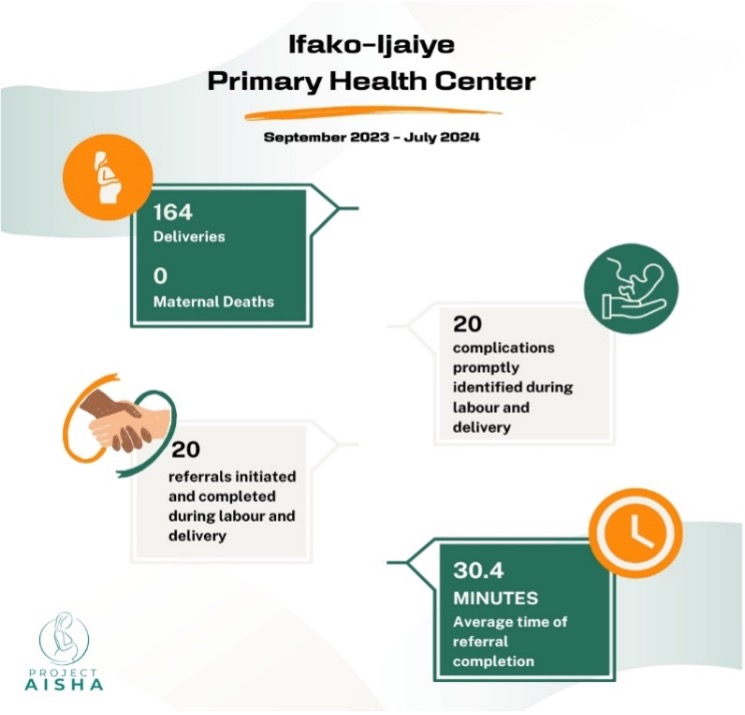Enhancing Labor and Childbirth Services at Ifako-Ijaiye PHCC – A Collaborative Journey with Project Aisha

Located in the heart of Lagos, Nigeria, Ifako-Ijaiye Primary Health Care Centre (PHCC) has become a cornerstone for maternal health services in its community. Operating 24 hours a day, the center serves a densely populated area and is staffed by a dedicated team of 9 healthcare professionals, including nurses, midwives, and health attendants. The PHCC offers comprehensive maternal, newborn, and child health services, making it an essential resource for expectant mothers in Ifako and surrounding areas. With its steady influx of patients, the facility’s high utilization rates underscore its critical role in the local healthcare landscape.
In April 2023, Ifako-Ijaiye PHCC partnered with Project Aisha to implement quality improvement (QI) initiatives aimed at enhancing maternal healthcare services. These initiatives focused on key areas such as reducing the stock-out rate of uterotonics, improving referral processes, and enhancing antenatal care (ANC) with standardized tools like the ANC checklist. The collaboration also involved creating structured ANC health talks, improving the identification of obstetric complications, and ensuring the correct and consistent use of the partograph—a vital tool for monitoring labor.
Reflecting on the impact of this partnership, the Officer-in-Charge of the facility stated, “Our collaboration with Project Aisha has been instrumental in elevating the quality of care we provide. Through this partnership, we’ve implemented strategies that have significantly improved maternal health outcomes.”
Improved Labor Management through the Partograph
Central to the success of this collaboration is the consistent and correct use of the partograph, a graphical tool used to monitor labor and the immediate postnatal period. The consistent correct use of partographs has been a transformative part of the QI initiative at Ifako-Ijaiye PHC.
“The partograph scoring tool has strengthened our labor management and enhanced our documentation of labor processes,” explains the Officer in Charge. “It ensures that all team members are aligned in monitoring labor progress and making timely decisions, such as referring patients when necessary.”
Before the QI initiative, a clinical audit in September 2023 revealed that while the partograph was being used 100% of the time, only 20% of these were correctly completed. Recognizing this gap, the QI team employed a root cause analysis using the fishbone diagram tool to identify the underlying issues and develop practical solutions. These included providing standardized partographs, conducting refresher training for healthcare workers, and instituting weekly clinical audits to support compliance.
By July 2024, the correct usage of the partograph improved from 20% to 100%, marking a significant step forward in labor management practices. This improvement is reflected in the 164 deliveries conducted at the facility during this period, with zero maternal and perinatal deaths reported. Moreover, complications such as obstructed labor and postpartum hemorrhage were quickly identified and referred to the appropriate centers for care.

“Since implementing these changes, we’ve seen a noticeable increase in the identification of complications and prompt referrals, leading to zero maternal mortality since September 2023,” says the Officer in Charge proudly.
Addressing Referral Delays with Stakeholder Engagement

One of the key challenges identified during the QI process was the delayed interval between the decision to refer a patient and the time they reached the referral center. In September 2024, the average referral time was 45 minutes, largely due to unreliable emergency transport services.
To address this, the QI team engaged with key stakeholders, including the National Union of Road Transport Workers, to secure reliable transport options. Additionally, pregnant women were educated on referral indicators and encouraged to bring a family member or friend to help expedite the process. After 10 months of implementing these solutions, the referral time decreased to an average of 30.4 minutes.
Sustaining Progress in a Challenging Environment
Despite the notable progress, the facility has faced challenges such as staff attrition, which at times has affected the consistency of documentation. To mitigate this, the team has implemented a system for ongoing learning through facility QI meetings, ensuring both new and existing staff stay informed and involved in QI activities. This system, along with a robust monitoring and evaluation approach, helps sustain the gains made and adapt to new challenges.
Looking forward, the focus will remain on sustaining these improvements as Project AISHA’s support gradually diminishes. Ifako-Ijaiye PHC is actively exploring ways to maintain its success, such as enhancing internal processes through continuous training and utilizing the improvement model for future quality initiatives.
“We remain committed to sustaining the progress we’ve achieved and further enhancing maternal care by improving delivery numbers and increasing the number of women who consistently attend ANC visits,” says the Officer-in-Charge. “Our goal is to continue improving standards of care and reducing maternal and neonatal mortality.”
A Lasting Impact on Maternal Health
The effect of Project AISHA on Ifako-Ijaiye Primary Health Centre serves as a powerful example of how focused interventions and collaborative support can transform healthcare services. By improving labor management practices, enhancing referral processes, and building the capacity of healthcare workers, the facility has made significant strides in saving lives and improving health outcomes for mothers and their babies.
As Amina, a pregnant woman accessing care at the PHC, shares: “During the health talks, the nurses really emphasized the importance of having a support person with me during my visits. They encouraged me to come to the facility with my husband, a family member, or a close friend. Having that extra support is helpful, especially in case of an emergency that requires a referral.”
In conclusion, Project AISHA’s partnership with Ifako-Ijaiye PHC exemplifies how strategic quality improvements can create a lasting, positive impact on maternal health. By continuing to build on these successes, the PHC is setting a new standard for maternal care in the community—one that will undoubtedly save more lives and reduce maternal and neonatal mortality in the years to come. Funded by MSD for Mothers and implemented by four consortium partners—HSDF, IHI, mDoc, and Ingress Health Partners—Project Aisha is transforming maternal care in Nigeria.
Grants and Business Development Specialist
We are seeking a highly motivated and experienced Grants and Business Development Specialist to join our organization. The successful candidate will be responsible for identifying funding opportunities, developing grant proposals, and fostering partnerships with potential donors and stakeholders (regional and global). This role plays a vital part in securing funds and resources to support our organization’s mission and projects.
Apply NowPublic Health Consultant, Guinea
The consultant (working with the Accelerator team) will collect results from the tool, organize a meeting with stakeholders to discuss results from the tool, and produce a report on key findings and recommendations from the tool to be shared publicly.
Apply NowPublic Health Associate, Senegal
We are currently in search of an experienced Public Health professional in Senegal to work on the anticipated Nutrition Capacity Development and Financing Platform and provide technical assistance to elevate nutrition financing and strengthen local capacity to support these efforts. The Associate must be bilingual (English and French).
Apply Now